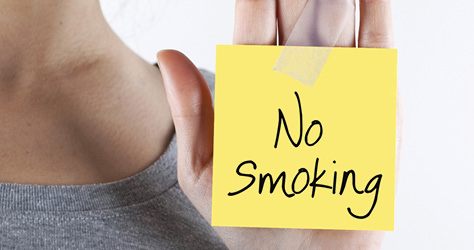Giving your baby the best start in life
Giving up smoking – ideally before you conceive – will not only improve your own health, but also give your unborn baby a better start in life too.
At a glance
- Giving up smoking during pregnancy will boost your baby’s growth and development
- Stopping isn't easy, but you CAN do it - think of all the benefits for you and your baby
- It's never too late to quit - stopping at any point of your pregnancy will give your baby a better start

You can do it...
Giving up smoking during pregnancy will not only boost your baby’s development, but help improve your baby’s health right into adulthood – an important motivator to finally kick the habit. Giving up smoking in pregnancy will also mean your child has a lower risk of health problems, such as asthma and lung infections. The poisons and chemicals in smoke can damage your unborn baby’s lungs, which can affect them throughout their life. Your child is also less likely to become a smoker.
Stopping isn't easy, but you CAN do it, and keeping mind the risks to you and your baby might make it easier for you to quit. Did you know for example, that every time you have a cigarette, you are exposing yourself and your unborn baby to over 4,000 chemicals? Smoking also interferes with the oxygen supply to your baby, meaning their tiny heart has to beat harder every time you have a cigarette.
Smoking during pregnancy may also be linked to problems including:
If you smoke whilst you are pregnant you are also more likely to have your baby early or have a very small for their age baby, which can lead to longer term health problems immediately after birth and into childhood.
What are the benefits of giving up?
The good news is that it’s never too late to benefit from quitting smoking. In fact, giving up smoking before 15 weeks reduces your risk of premature birth and having a low birth weight baby to that of a non-smoker. Even giving up at any time during pregnancy will help your baby by increasing the flow of oxygen that is needed to support her growth and development and give her a better start.
And by having a smoke-free home you will protect them from the affects of passive smoking (did you know more than 17,000 children under five are admitted to hospital each year because of the effects of second-hand smoke?).
Stopping smoking
We know it is not as easy as just never lighting up again, and you will need lots of willpower and motivation, not to mention support and guidance.
Smoking in pregnancy is something midwives have to speak about with all the women they work with, so don’t feel that you are being singled out.
Your midwife will ask lots of questions about your lifestyle, including whether you smoke or have recently quit, or if someone in your household smokes.
They are also likely to do a carbon monoxide screen with you as part of the tests carried out in pregnancy.
Carbon monoxide is a poisonous gas that you can’t see or smell but which can harm you and your baby. You come into contact with it if you, or someone you live with, smokes. However it can also be in your home (or place of work) if you have a faulty boiler or heating appliance like a gas fire. Knowing if it is present is important so you can do something about it.
If you are using a vape or e-cigarette (or considering swapping) it's important to appreciate that they have not been around long enough for long-term research to be completed. They are possibly safer as e-cigarettes usually only contain nicotine plus a chemical called propylene glycol which carries the nicotine in the vapour so it can be inhaled. Some brands of e-cigarettes are sold as nicotine free. But if you are a smoker the absolute safest thing you can do for you and your unborn baby's health is to quit immediately.
Licensed NRT (Nicotine Replacement Therapy) products can increase the chances of quitting successfully. This is particularly the case when combined with specialist help from stop smoking services. If you do smoke or have quit within the past two weeks, your midwife will refer you to a Pregnancy Stop Smoking advisor at your local branch of the NHS Stop Smoking Services.
Watch this NHS video about smoking in pregnancy.
----------------------------------------------------------------------------------
